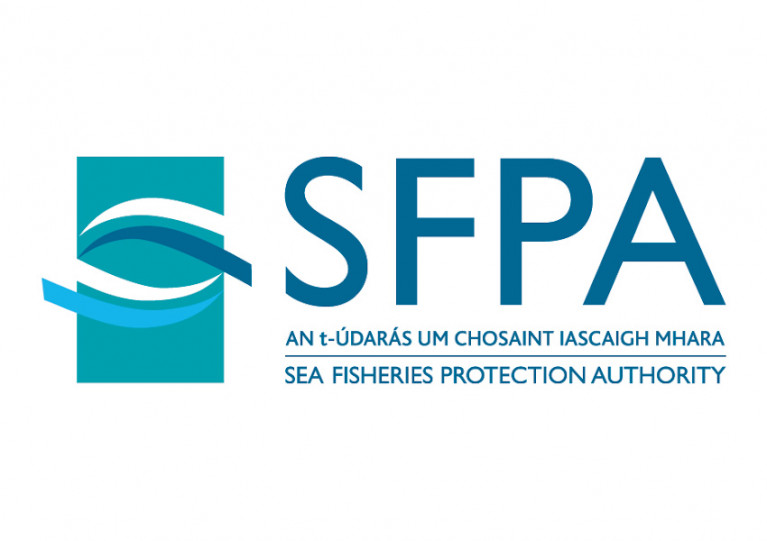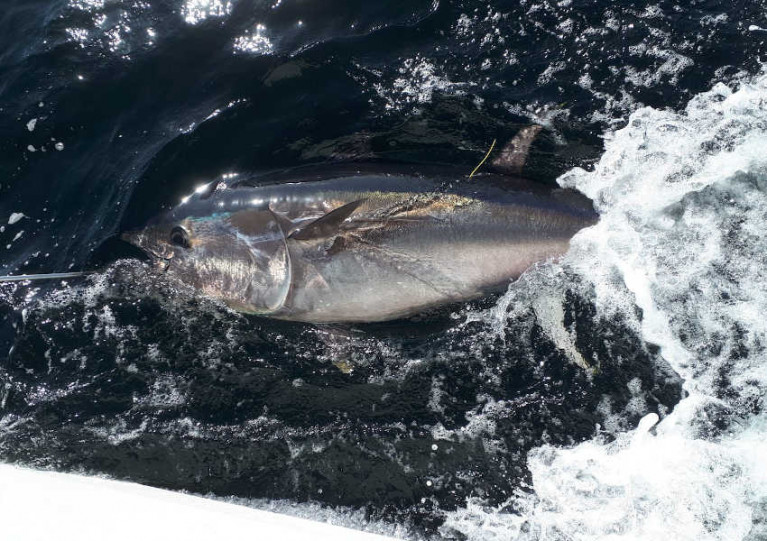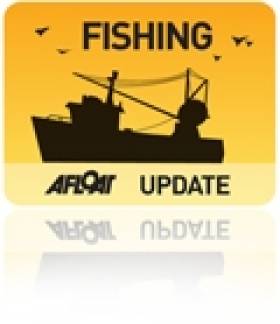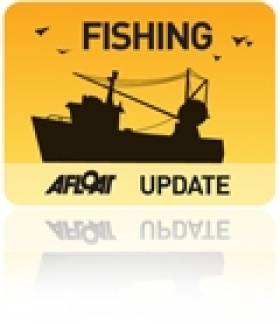Displaying items by tag: Sea Fisheries Protection Authority
Strike Action Notice by State's Sea Fisheries Inspectors Suspended as Date Set for Talks
Notice of “rolling 24-hour stoppages” by State sea fisheries inspectors was suspended last night as a dispute between staff and management was referred to the Workplace Relations Commission (WRC)
As Times.ie reports today, trade union Fórsa confirmed that it has accepted an invitation to participate in a WRC hearing on Friday, and will suspend “proposed action as a result”.
Sea Fisheries Protection Authority (SFPA) staff voted “overwhelmingly” late last month for industrial action in a disagreement over consultation on management changes to the State body.
The first in a series of 24-hour stoppages at the State’s sea fisheries harbours was due to take place from midnight next Monday, March 8th.
Any industrial action could affect inspections of fish landings at the State’s six sea fishery harbours of Killybegs, Co Donegal, Ros-a-Mhíl, Co Galway, An Daingean (Dingle), Co Kerry, Castletownbere, Co Cork, Dunmore East, Co Waterford and Howth, Co Dublin.
The SFPA’s remit involves both compliance with and “effective enforcement” of sea-fisheries law and seafood safety law”, and it works with the Naval Service on inspections of fishing vessels under the EU’s Common Fisheries Policy.
The union’s marine branch represents approximately 110 members at the SFPA, which has its headquarters in Clonakilty, Co Cork.
Fórsa confirmed that notice of action was served last week, and said that the dispute “involves the findings of an independent review of the SFPA”.
A Price Waterhouse Coopers (PWC) review of the SFPA finalised last year found that the authority was “not working effectively” and required “urgent attention”.
The PWC review referred to a European Commission audit of 2018 in Killybegs, which has led to a recent demand from the EU for “payback” of Ireland’s mackerel quota due to issues with weighing and under-reporting of catches.
The EU audit, published in 2019, found Ireland had overfished its quota of mackerel by 28,600 tonnes, its horse mackerel quota by 8,100 tonnes and its blue whiting quota by 5,600 tonnes between 2012 and 2016.
Minister for Marine Charlie McConalogue is currently engaging with the EU on the “payback” sought.
It is understood that SFPA staff believe they are being blamed by the Department of Agriculture, Food and Marine for the under-reporting.
Fórsa says that SFPA management had agreed to a joint approach with staff on implementing 47 recommendations made by the Pwc in relation to changes in the organisation.
The SFPA said it did not wish to comment.
Read more on Times.ie here
Nearly 700 illegally caught lobsters have been seized in an operation in Rosslare, as RTÉ News reports.
Officers from the Sea Fisheries Protection Authority (SFPA) detained a Spain-bound lorry in the Co Wexford port town yesterday, Wednesday 22 July.
On board they found more than 600 of its 6,000-lobster load were undersized — and 60 others were V-notched, indicating female lobsters which must be returned for breeding.
It followed an earlier incident this week in which SFPA officers seized 86 lobsters from a recreational fisher, despite the law allowing only one lobster to be caught per day and with sales prohibited.
RTÉ News has more on the story HERE.
Twenty-two charter angling vessels have been granted authorisation to participate in a bluefin tuna data collection programme after a successful pilot last year.
The Tuna CHART (CatcH And Release Tagging) programme will see skippers catch, tag, measure and release Atlantic bluefin tuna for data collection purposes off the Irish coast.
The authorised vessels, which are located in Cork, Clare, Galway, Sligo and Donegal, will support an international scientific programme to increase knowledge of the behaviour and abundance of bluefin tuna in Irish waters and across its distribution generally.
Atlantic bluefin tuna, the largest tuna in the world, frequent Irish coastal waters to feed during the species’ annual migration through North Atlantic waters.
The bluefin tuna is prized by sea anglers for its power and fighting ability and is a very valuable commercial species, though there is currently no sport or commercial fishery for bluefin tuna in Ireland.
The new programme, which has been developed by Inland Fisheries Ireland and the Marine Institute in partnership with the Sea Fisheries Protection Authority and the former Departments of Agriculture, Food and the Marine, and Communications, Climate Action and Environment, will operate again in 2020 having commenced on a pilot basis in 2019.
Eamon Ryan TD, minister with responsibility for inland fisheries, said: “The 22 angling vessels authorised by my department, increased from 15 last year, will contribute substantially to essential bluefin tuna data collection as they migrate along the Irish coastline.
“The recreational fisheries sector is crucial in the delivery of this research programme and we look forward to continue working with all the State agencies involved.
“I want to acknowledge the key role of the authorised charter skippers and their crews who are bringing their unique expertise to bear on providing valuable data for scientific purposes, and the ‘citizen scientist’ anglers who will catch the fish. The fact that 209 fish were tagged last year with no mortalities is a great achievement by the skippers.”
The Sea Fisheries Protection Authority and Inland Fisheries Ireland will undertake inspections and patrols around the coast to ensure this remains a strictly controlled programme.
A full list of authorised skippers can be found at www.fisheriesireland.ie/bluefin
Fisherman Defends Giveaway of Over-Quota Monkfish
#FISHING - A Wexford fisherman has defended the free giving away of monkfish to the public yesterday morning after exceeding an EU quota.
RTÉ News reports that Seamus O'Flaherty, owner of the trawler Saltees Quest, handed out the fish to hundreds of passers-by at Kilmore Quay rather than have the surplus catch thrown back into the water.
The vessel's skipper Jimmy Byrne defended the move as a protest against an EU rule that requires over-quota fish to be discarded at sea.
According to The Irish Times, officers with the Sea Fisheries Protection Authority, who observed the monkfish giveaway yesterday, have prepared a file for submission to the Director of Public Prosecution.
The authority said it found a large quantity of monkfish retained on the vessel which had been logged as having been discarded - and emphasised that catches landed that are not declared as discards are still counted against the national quota.
Byrne, meanwhile, described the practice of discards of dead fish as "crazy" especially when many people in Ireland are "going hungry".
He commented: “I have a certain quota of fish to catch and the monkfish end up getting caught. There’s more monkfish in Ireland than ever before. I can’t tell the monkfish not to go into the net."
The Irish Times has more on the story HERE.
#fisheries – The Sea-Fisheries Protection Authority (SFPA) will host a seminar entitled Pelagic Fisheries – Monitoring, Control and Surveillance from today, Tuesday 19th June to Thursday 21st June at their head office in Clonakilty. The seminar will include delegates from: the Norwegian Fisheries Directorate; the Irish Naval Service; the Marine Institute; Marine Scotland, the Scottish Control authorities; the National Bureau of Criminal investigation (NBCI); representatives from the Irish pelagic industry as well as the SFPA. The key objective of the seminar is to share information and best practice in terms of verifying compliance of pelagic fisheries at sea.
The first session takes place today, Tuesday 19th June and will involve a number of presentations including; an overview of Norway's and Ireland's fisheries control procedures; the fisherman's perspective on compliance and control; pelagic stocks and fisheries in the North East Atlantic from a scientific perspective and the origins, role and purpose of the EU/Norway Pelagic Technical Working Group.
On the second day the focus will be on best practices in fisheries control at sea and on landing. There will also be a discussion on lessons learnt from previous enforcement actions both in Ireland and Scotland.
The final day will involve a perspective of an industry group who have harnessed the benefit of compliance to achieve external accreditation of their fishery and associated labelling of their product. Following this, the seminar will focus on developing agreed action points and steps to implementation.
Andrew Kinneen, Board member with the SFPA said: "This seminar will provide an excellent opportunity for key representatives from Norway, Scotland and Ireland to share valuable information on how best to monitor the legal exploitation of pelagic fisheries around the coasts of Ireland. The SFPA wants to play our part in protecting the rich resources of mackerel, herring and other pelagic fish around the coasts of Ireland for the benefit of responsible fishermen. We need to ensure we have the best systems in place so that illegal practices such as high-grading are prevented. The effective monitoring and control of these pelagic fish stocks requires the close co-operation of Ireland with other Member States and with Norway. I am sure this seminar will help promote a level playing field of best practice amongst the participants. We look forward to a fruitful exchange of information and ideas on how we can best work together to protect the interests of legitimate fishermen.
The Irish seafood industry is vitally important to our economy - total sales of Irish seafood on both domestic and export markets, excluding direct landings for Irish vessels into foreign ports, amounted to €730 million in 2008 which represented 345,000 tonnes. Exports of Irish seafood for 2010 are estimated at €365 million. An estimated 75% of Irish seafood exports are sold in EU markets - markets outside of the EU are also of vital importance notably for Ireland's pelagic fleet which fishes mainly mackerel, horse mackerel, herring and blue whiting. Nigeria and Russia are among the main markets for these species. This seminar will seek to underline that good goverance overall and co-ordinated monitoring effort between Ireland and other countries is the way forward to safeguarding jobs and securing a profitable future for Ireland's fish catching and processing sectors."






























































